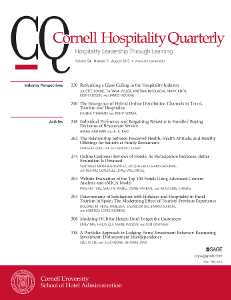Gerald Zaltman on New Marketing Science for Hospitality Practitioners
 Gerald Zaltman, Joseph C. Wilson Professor Emeritus at Harvard Business School and creator of the first patented market research tool in the United States titled the Zaltman Metaphor Elicitation Technique, recently collaborated with Jerry Olson and James Forr of Olson Zaltman Associates on their article “Toward a New Marketing Science for Hospitality Managers” from Cornell Hospitality Quarterly.
Gerald Zaltman, Joseph C. Wilson Professor Emeritus at Harvard Business School and creator of the first patented market research tool in the United States titled the Zaltman Metaphor Elicitation Technique, recently collaborated with Jerry Olson and James Forr of Olson Zaltman Associates on their article “Toward a New Marketing Science for Hospitality Managers” from Cornell Hospitality Quarterly.
The abstract:
A New Marketing Science (NMS) is proposed that can dramatically improve a firm’s marketplace performance. The NMS challenges managers to dare to think and act differently. It generates deep insights into the thoughts and actions of both customers and managers and how the two mind-sets interact. As several examples illustrate, it departs from the “old” marketing science by its emphasis on imagination, knowing how and why a practice works, understanding the total customer experience, and focus on effectiveness over efficiency. The NMS is grounded in principles from the behavioral sciences and humanities such as the importance of the unconscious mind, the way mental frames serve as interpretative lenses, the centrality of emotions, the reconstructive nature of memory, and the importance of metaphor for learning about and influencing choices.
You can read “Toward a New Marketing Science for Hospitality Managers” from Cornell Hospitality Quarterly for free by clicking here. Want to know when all the latest research like this is available from Cornell Hospitality Quarterly? Click here to sign up for e-alerts!































































































